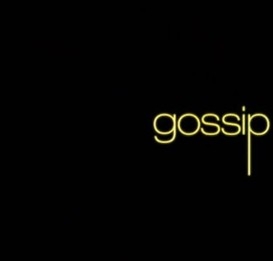
Acouple of weeks ago I bumped into a man I used to work with. We chatted for a bit about people we knew in journalism, and I volunteered that so-and-so had just left his wife and was now shacked up with one of his underlings. My ex-colleague pursed his lips. I don’t do gossip, he said.
幾周前,我碰巧遇到一位過去的同事。聊了一陣我們?cè)谛侣剺I(yè)中的舊相識(shí)之后,我主動(dòng)提到,某某某剛和老婆分手,現(xiàn)在正和一名下屬同居。這位前同事撅撅嘴,說他不愛八卦。
For about two seconds I felt ashamed of myself, but then I felt cross with him instead. What a prig. How can you be a former journalist and not do gossip?
有那么大約兩秒鐘的功夫,我為自己感到羞恥。不過,我隨即就對(duì)他感到生氣。這個(gè)假正經(jīng)!你怎么可能當(dāng)過記者卻不八卦?
Gossip has a bad name. The Oxford dictionary defines it disdainfully as “unconstrained conversation . . . about other people, typically involving details which are not confirmed as true”. Yet it has always struck me as one of those rare guilty pleasures where pleasure outweighs guilt. The damage done to the subject of the gossip is generally negligible, while the fun and fellow feeling created between the chatterers is considerable.
“八卦”一詞的名聲不太好。牛津英語詞典輕蔑地將這個(gè)詞定義為“涉及他人、細(xì)節(jié)真實(shí)性未經(jīng)驗(yàn)證的……不節(jié)制的談話”。不過,在我看來,八卦雖說是一種“罪惡的樂趣”,但其樂趣成分罕見地超過了其罪過。對(duì)于八卦的對(duì)象來說,八卦造成的損害通常可以忽略不計(jì),而聊天者從中獲得的樂趣和融洽感卻是顯而易見的。
However, according to recent research from Stanford University, published in Psychological Science, not only have I done no harm by gossiping, I have been making the world a finer place. Talking about people behind their backs increases co-operation, upholds the moral code, punishes the selfish and rewards the unselfish. And if people know they get voted off the island for bad behaviour, they behave less badly.
不過,根據(jù)斯坦福大學(xué)(Stanford University)最近的一項(xiàng)研究(該研究成果發(fā)表于美國《心理科學(xué)》(Psychological Science)雜志),八卦不僅無害,還對(duì)改善這個(gè)世界做出了貢獻(xiàn)。在背后談?wù)撍四茉鲞M(jìn)合作,弘揚(yáng)道德準(zhǔn)則,懲罰自私者并獎(jiǎng)勵(lì)無私者。如果“惡人”知道自己會(huì)因惡行被大家“投票踢走”,他們就會(huì)收斂一點(diǎn)。
If this is right, it suggests gossip is particularly important in offices. It helps us know who to avoid, it undermines bullying bosses, it binds people together and shores up a company’s culture.
如果屬實(shí),這個(gè)結(jié)論意味著八卦在職場(chǎng)上有特殊的重要性。它能幫助我們了解應(yīng)躲開誰,能削弱那些霸道的老板,能增進(jìn)團(tuán)結(jié),還能鞏固企業(yè)文化。
Soon after reading the study, I found myself at it again over coffee with a colleague. I mentioned a well- known broadcaster with whom I had worked in the past and said although he was clearly talented, there was something about him that was a bit, well, weird. My colleague agreed. He too had worked with the man and said he was a prima donna and a bully, and that the only views he rated were his own.
就在讀到這篇論文后不久,我在和一位同事喝咖啡時(shí)又八卦了一次。當(dāng)時(shí)我提到一位我曾與之共事過的知名播音員,我說他盡管顯然很有才華,不過為人有點(diǎn)……怎么說呢……有點(diǎn)怪。我的同事表示同意。他也曾與這個(gè)人共事過,他說這個(gè)人自大又霸道,只在乎自己的看法。
I listened agog; instead of feeling sullied, I congratulated myself on having contributed to the public good by expressing disapproval of bullies and egotists.
我興奮地聽他說著,不但沒有“非禮勿聽”的感覺,反而覺得自豪,因?yàn)槲易隽思幸嬗诖蠹业暮檬隆磉_(dá)了自己對(duì)霸道和自大的否定。
But then I saw a weakness in the system. For gossip to promote good behaviour it is not enough for tut-tutting to take place behind someone’s back. The subject has to get wind of it – which can be easier said than done. Next time I see the broadcaster, I’m not going to edge away in disgust; I’ll probably be all nicey-nicey.
不過,接著我就發(fā)現(xiàn),這種機(jī)制有一個(gè)缺陷。要想起到促進(jìn)善行的作用,只在別人背后嘮叨是不夠的。必須讓當(dāng)事人聽到這些話——而這說起來容易,做起來難。下次我見到這位播音員時(shí),我不會(huì)反感地躲開,反而可能會(huì)對(duì)他非常友好。
Indeed, what is truly remarkable is that given how much gossip there is (according to the anthropologist Robin Dunbar, two-thirds of all human conversation is gossip) and given how each of us must get gossiped about the whole time, how little we know about what people are saying about us behind our backs. I don’t have a clue what people say when I’m not around – which might be bad for my chances of improving, but it makes for an easier life.
事實(shí)上,考慮到人們八卦之頻繁(根據(jù)人類學(xué)家羅賓•鄧巴(Robin Dunbar)的說法,人類所有言談?dòng)腥种前素裕约拔覀兠總€(gè)人一直以來必然都經(jīng)常會(huì)被別人八卦,真正令人驚嘆的是,我們居然對(duì)別人在背后如何談?wù)撐覀冎跎佟N也恢牢也辉诘臅r(shí)候別人會(huì)說些什么,這或許不利于我進(jìn)步,不過這倒能讓我的生活更輕松一點(diǎn)。
There are various reasons why gossip does not usually get back to the person being gossiped about. First, as the whole point is that it is a) secret and b) usually considered of dodgy veracity, we are programmed not to act on it. An even bigger obstacle is that hierarchy trumps tittle-tattle every time. Voting people off the island on gossip grounds is particularly impossible if that person happens to be above you in the pecking order.
八卦通常不會(huì)傳回當(dāng)事人的耳邊,原因多種多樣。首先,八卦之所以是八卦,就是因?yàn)榘素允紫仁鞘敲孛艿模浯问钦鎸?shí)性默認(rèn)存疑,因此,我們本來就不會(huì)對(duì)八卦的內(nèi)容采取行動(dòng)。更大的障礙在于,等級(jí)制度總是能壓過閑言碎語。如果一個(gè)人的“江湖地位”在你之上,通過八卦將這個(gè)人“踢走”尤其不可能。
More fundamentally, there are two problems with the idea of gossip as a regulating, moral force. The first is that the gossip needs to be mostly true – which is doubtful given its negative bias. “Psst, did you hear that x is a terrific, hardworking boss?” isn’t much of a story. Second, gossip isn’t always motivated by our moral values. In spreading the gossip about the journalist’s concubine I wasn’t necessarily upholding the sanctity of marriage. I was merely indicating I found the news a bit diverting.
更根本的原因在于,讓八卦發(fā)揮道德監(jiān)督作用的想法有兩個(gè)問題。首先,這要求八卦必須大多屬實(shí),而考慮到八卦的內(nèi)容一般偏負(fù)面,其真實(shí)性值得懷疑。“噓,你聽說了嗎,某某某是個(gè)特好的老板,工作特勤奮。”這樣的“八卦”算不上什么八卦。其次,八卦并不總是受到人們道德感的驅(qū)使。在傳播那位記者跟人同居的八卦時(shí),我未必是在維護(hù)婚姻的神圣性,只不過是覺得這消息可作談資。
Instead, the true value of gossip has nothing to do with the person being gossiped about, and everything to do with the people doing it. Last week I was introduced to a senior banker who turned out to have been at university at the same time as me. He mentioned the name of a famous contemporary and then said darkly: “He had quite a past. Nothing illegal, but wild.”
八卦的真正價(jià)值其實(shí)和八卦的當(dāng)事人無關(guān),而和八卦的傳播者密切相關(guān)。不久前我被引見給一位資深銀行家,結(jié)果發(fā)現(xiàn)他和我是同一時(shí)期上大學(xué)的。當(dāng)時(shí),他提到一位著名的同齡人,然后幽幽地說:“他的故事可多了。雖然談不上犯法,但也夠瘋狂的。”
“Really?” I said. “Do tell.”
“真的么?”我問道,“快說說是怎么回事。”
And so he told me how this legendary businessperson used to be a rabid womaniser, which we agreed was surprising as he wasn’t much of a looker.
于是他告訴我,這位傳奇商人大學(xué)時(shí)可謂獵艷高手。考慮到他的長相不算出眾,我倆都覺得這挺讓人驚訝的。
This gossip served no social or moral purpose. It was in the deep past. It was tenuous. It was quite irrelevant to anything. And yet it was still valuable. It told me about this banker: I’m quite fun, but I’m not entirely to be trusted.
這條八卦沒什么社會(huì)價(jià)值,也沒什么道德價(jià)值。它發(fā)生在久遠(yuǎn)的過去,事情本身無足輕重,跟任何東西都毫不相干。不過這條八卦還是有價(jià)值的。它向我透露出:這位銀行家是個(gè)很有趣的人,但不太值得信賴。












